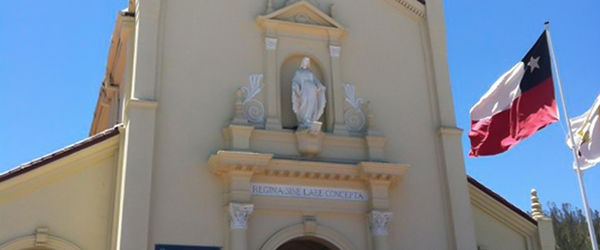At first, Jose is hesitant. But, prompted by his fellow countrymen and women, he opens up.“I will go back to Mexico because here, even if you work and work, it's hard to get people's trust,” he says sadly, while his partner Maria looks on, and their 5-year-old son plays nearby with other kids. “I know it's also difficult in Mexico....”Other people waiting in line with Jose on this Saturday morning in Reseda try to convince him not to leave. “Do it for your son,” a woman tells him, encouraging him to stay. “He doesn't know of any other place but here [United States].” “You're still young,” a man tells him. “Just get your GED and move on,” adds a third person.All of them were waiting April 20 at St. Catherine of Siena Church to get their Mexican passport, or the “matricula consular,” an identification card issued by the Mexican government to undocumented immigrants, with limited use in the U. S. Mexican Consulate personnel had installed its equipment at St. Catherine’s Monsignor Hackett Hall, to offer its services to all residents of Mexican descent in the San Fernando Valley.Most of the people in attendance were aware of the new proposed immigration bill “Border Security, Economic Opportunity, and Immigration Modernization Act,” that the so-called Gang of 8 submitted to Congress April 17, but not many of them were willing to speak to the media. Those who did were hesitant to disclose their full names, though they are hopeful that the proposed bill is approved.Fear has been a constant in their lives, they said. Fear of getting thrown in jail, fear of being deported and separated from their families, fear of not belonging after living in the country for 20 years — like Jose and two other women in the group at St. Catherine, whose children are U.S. citizens.“They make us feel we don't belong here,” said Jose, 32. "I've been working —sometimes in more than two jobs — all my life, since I got here when I was 12 years old, to make ends meet and to try to be a good person.”A woman in line, declining to state her name, said, “I've been here for more than 20 years, paid my taxes, my three teenage kids were born here and my husband is a hardworking man, but I don't have papers. I think they need to get to know us better and see where we stand and see our contributions to this country.”In an effort to help ease that fear and offer a sense of belonging, parish leadership at St. Catherine of Siena is working on a pilot program that stemmed from the five priorities outlined by Archbishop José Gomez in his October 2012 pastoral letter, “Witness to the New World of Faith,” and a subsequent series of discussions led by an immigration team formed by inner-city parish clergy and coordinated by the archdiocesan Office of Life, Justice and Peace.On Palm Sunday, St. Catherine launched the “faith card,” a non-mandatory $2 identification for parish members that shows the name of the parish, name of the card holder and optional photograph, card number and expiration date (10 years after issuance) or "member since..." “We love because he first loved us,” is written on the lower right corner on the front of the card. The back is imprinted with the church's logo and the slogan, “He makes all things new,” that corresponds to the theme of new evangelization. A pamphlet, “Our Faith Card," will soon be circulating throughout the parish.“Our primary interest is their [parishioners] faith, their belonging to the community of Christ,” Father Paul Griesgraber, St. Catherine of Siena pastor, told The Tidings. “And it's great if it helps for other purposes, to show that they have belonged to the community of faith for a period of time.”The Reseda parish — about 65 percent Latino, 30 percent Filipino, and the rest a mix of Caucasians, Vietnamese, African Americans and Sri Lankans — is spearheading the archdiocesan effort that includes 11 parishes for this pilot program.“Archbishop Gomez wanted the committee to move swiftly [in issuing the faith card], but he wanted it to be done responsibly, with due diligence,” said Father Griesgraber.It's about “human dignity, deepening people’s sense of identity and promoting and providing ways of connectedness of the body of Christ,” said Enrique Andres, an immigration lawyer and active church member who has been involved in the legalities of the process.There is a “deeper meaning in what we are doing,” he said. It is expected that the card will help with fellowship and parishioners' involvement in the different ministries and programs.In its first phase the card is only being issued to nearly 400 lay volunteers and leaders 14 years old and above, and later to additional parishioners. The eight-member Core Team is working on a module to be presented in early May to the immigration clergy team. It could be implemented in the other 10 pilot program parishes.“We want to give opportunities and tell people that they belong to the family [of God],” said Father Griesgraber, adding that this opportunity is available to everyone residing in the parish's surrounding area.“The definition of parishioner is someone who lives in the parish's territory, not restricted to a baptized Catholic,” said the pastor. “No one comes unless the Father draws them.”{gallery width=100 height=100}gallery/2013/0426/immigration/{/gallery}

